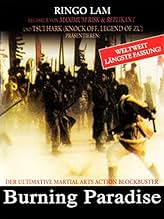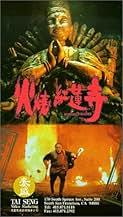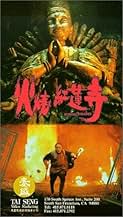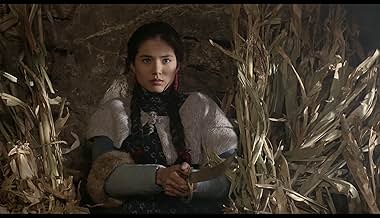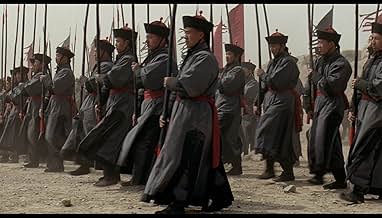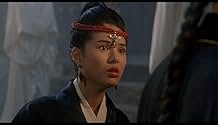Agrega una trama en tu idiomaAn exotic and legendary battle between the forces of good and evil comes to life when the celebrated disciples of the Shaolin Temple fight against the evil followers of China's Manchu rulers... Leer todoAn exotic and legendary battle between the forces of good and evil comes to life when the celebrated disciples of the Shaolin Temple fight against the evil followers of China's Manchu rulers.An exotic and legendary battle between the forces of good and evil comes to life when the celebrated disciples of the Shaolin Temple fight against the evil followers of China's Manchu rulers.
- Dirección
- Guionistas
- Elenco
- Dirección
- Guionistas
- Todo el elenco y el equipo
- Producción, taquilla y más en IMDbPro
Opiniones destacadas
The Red Lotus Temple, where most of Ringo Lam's "Burning Paradise" takes place, is a real house of horrors. The temple prison is where followers of Shaolin are taken, mostly to be killed in various gruesome ways. The lead character, Fong Sai Yuk, is a Chinese hero who has appeared in other movies, such as the two starring Jet Li. Here, Fong Sai Yuk's opponent is the insane military man who controls the temple. This guy is impervious to weapons, as Fong finds out early in the picture. More than anything else, "Burning Paradise" is a horror movie. Instead of a haunted house where visitors die, you have prisoners in a temple in which there seems to be no escape. Still, the movie is well made. If this movie were released in the US, it would easily get an R-rating for violence.
Burning Paradise is an Amazing movie. I loved Magnificent Tiger Stance combined with Incredible Crane Stance. Willie Chi is a great Martial Artist, almost as good as Jet Li. This a must see, and a must buy movie. The story is about Fong Sai Yuk and Hung Hey-kwun. Fong is fighting The evil Manchus. And Hung is pretending to be a Manchurian, but he is really drawing a map of the Red Lotus Temple. In the end Fong has to save his girlfriend and fight the very powerful and evil Elder Kung. I give this movie 9/10.
(1994) Burning Paradise
(In Chinese with English subtitles)
ACTION/ HISTORICAL FICTION/ COMEDY
Another 'Fong Sai Yuk' period period piece whereas most of the action takes place in the "Red Lotus Temple" similar to tombs the Indiana Jones does his adventures in except that the person who lives in this one pretty much may also be the one who build and designed it. Anyways, cult martial art figure baddie has main objective was to capture and destroy all the Shaolin Temples before making their pupils/ students to work as slaves for the "Red Lotus Temple" showcasing folk lore hero Fong Sai-yuk at beginning stages attempting to run away from being captured along with his Shaolin teacher but are eventually captured. Wires was used for the fights at the early stages but not so much as the film progresses.
Another 'Fong Sai Yuk' period period piece whereas most of the action takes place in the "Red Lotus Temple" similar to tombs the Indiana Jones does his adventures in except that the person who lives in this one pretty much may also be the one who build and designed it. Anyways, cult martial art figure baddie has main objective was to capture and destroy all the Shaolin Temples before making their pupils/ students to work as slaves for the "Red Lotus Temple" showcasing folk lore hero Fong Sai-yuk at beginning stages attempting to run away from being captured along with his Shaolin teacher but are eventually captured. Wires was used for the fights at the early stages but not so much as the film progresses.
10winner55
This is one of the finest films to come out of Hong Kong's 'New Wave' that began with Tsui Hark's "ZU: Warriors of Magic Mountain". Tsui set a tone for the New Wave's approach to the martial arts film that pretty much all the directors of the New Wave (Jackie Chan, Sammo Hung, Wong Jing, Ching Siu Tung, etc.) accepted from then on as a given; namely, the approach to such films thenceforth would need more than a touch of irony, if not outright comedy. "Burning Paradise" put a stop to all that, and with a vengeance.
It's not that there isn't humor here; but it is a purely human humor, as with the aged Buddhist priest at the beginning who somehow manages a quick feel of the nubile young prostitute while hiding in a bundle of straw. But this is just as humans are, not even Buddhist priests can be saints all the time.
When irony is at last introduced into the film, it is the nastiest possible, emanating from the 'abbot' of Red Lotus Temple, who is a study in pure nihilism such as has never been recorded on film before. He is the very incarnation of Milton's Satan from "Paradise Lost": "Better to rule in Hell than serve in heaven!" And if he can't get to Satan's hell soon enough, he'll turn the world around him into a living hell he can rule.
That's the motif underscoring the brutal violence of much of the imagery here: It's not that the Abbot just wants to kill people; he wants them to despair, to feel utterly hopeless, to accept his nihilism as all-encompassing reality. Thus there's a definite sense pervading the Red Temple scenes that there just might not be any other reality outside of the Temple itself - it has become all there is to the universe, and the Abbot, claiming mastery of infinite power, is in charge.
Of course, fortunately, the film doesn't end there. Though there are losses, the human will to be just ordinarily human at last prevails. (If you want to know how, see the film!) Yet there is no doubt that, in viewing this film, we visit hell. Hopefully, we do not witness our own afterlives; but we certainly feel chastened by the experience - and somehow better for it over all.
It's not that there isn't humor here; but it is a purely human humor, as with the aged Buddhist priest at the beginning who somehow manages a quick feel of the nubile young prostitute while hiding in a bundle of straw. But this is just as humans are, not even Buddhist priests can be saints all the time.
When irony is at last introduced into the film, it is the nastiest possible, emanating from the 'abbot' of Red Lotus Temple, who is a study in pure nihilism such as has never been recorded on film before. He is the very incarnation of Milton's Satan from "Paradise Lost": "Better to rule in Hell than serve in heaven!" And if he can't get to Satan's hell soon enough, he'll turn the world around him into a living hell he can rule.
That's the motif underscoring the brutal violence of much of the imagery here: It's not that the Abbot just wants to kill people; he wants them to despair, to feel utterly hopeless, to accept his nihilism as all-encompassing reality. Thus there's a definite sense pervading the Red Temple scenes that there just might not be any other reality outside of the Temple itself - it has become all there is to the universe, and the Abbot, claiming mastery of infinite power, is in charge.
Of course, fortunately, the film doesn't end there. Though there are losses, the human will to be just ordinarily human at last prevails. (If you want to know how, see the film!) Yet there is no doubt that, in viewing this film, we visit hell. Hopefully, we do not witness our own afterlives; but we certainly feel chastened by the experience - and somehow better for it over all.
Burning Paradise is director Ringo Lam's dark take on the wuxia film. Much of what he did with the heroic bloodshed genre, he did here. If you have seen some classic Shaw Bros. Period kung fu flicks you should be familiar with the struggle with the treacherous Manchu's from up North reeking havoc through China. This is the struggle of Shaolin monks in an underground prison camp run by the villainous Manchu's. The tone is bleak and told in a fairly straightforward fashion with minimal humor. While this is a fantasy film, it's approached with more gritty realism than something like Swordsman 2. There is no lack of action to speak of. The entire film is jam packed with lots of exciting wire fu sequences and it gets quite messy with a lot of blood..The hero of the film(Fong Sai Yuk is a popular figure in thsrs films and is played much more serious here than the lighthearted take on the character that was made with Jet Li). The mood of the piece is very somber and bleak. The film looks sharp and the period costumes are good as well. Much of what the film does, it does well. There are no major
stars in this film, but rarely matters as everyone is good in their roles. Ringo Lam tells this story his own way and at his own pace making a very solid entry to the swordplay genre that is also both unique and well made.
¿Sabías que…?
- TriviaNot related to the previous two Fong Sai-Yuk movies with Jet Li. Even if this was released only a year later and has some of the same style of comedy and martial arts action.
- ConexionesRemake of Jiang hu qi xia (1965)
Selecciones populares
Inicia sesión para calificar y agrega a la lista de videos para obtener recomendaciones personalizadas
Detalles
Contribuir a esta página
Sugiere una edición o agrega el contenido que falta

